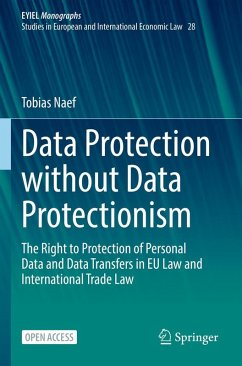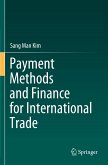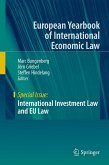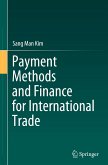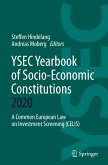This open access book offers a new account on the legal conflict between privacy and trade in the digital sphere. It develops a fundamental rights theory with a new right to continuous protection of personal data and explores the room for the application of this new right in trade law. Replicable legal analysis and practical solutions show the way to deal with cross-border data flows without violating fundamental rights and trade law principles.
The interplay of privacy and trade became a topic of worldwide attention in the wake of Edward Snowden's revelations concerning US mass surveillance. Based on claims brought forward by the activist Maximilian Schrems, the ECJ passed down two high-profile rulings restricting EU-US data flows. Personal data is relevant for a wide range of services that are supplied across borders and restrictions on data flows therefore have an impact on the trade with such services. After the two rulings by the ECJ, it is less clear then ever how privacy protection and trade can be brought together on an international scale.
Although it was widely understood that the legal dispute over EU-US data flows concerns the broad application of EU data protection law, it has never been fully explored just how far the EU's requirements for the protection of digital rights go and what this means beyond EU-US data flows. This book shows how the international effects of EU data protection law are rooted in the EU Charter of Fundamental Rights and that the architecture of EU law demands that the Charter as primary EU law takes precedence over international law. The book sets out to solve the problem of how the EU legal data transfer regime must be designed to implement the EU's extraterritorial fundamental rights requirements without violating the principles of the WTO's law on services. It also addresses current developments in international trade law - the conclusion of comprehensive trade agreements - and offers suggestion for the design of data flow clauses that accommodate privacy and trade.
The interplay of privacy and trade became a topic of worldwide attention in the wake of Edward Snowden's revelations concerning US mass surveillance. Based on claims brought forward by the activist Maximilian Schrems, the ECJ passed down two high-profile rulings restricting EU-US data flows. Personal data is relevant for a wide range of services that are supplied across borders and restrictions on data flows therefore have an impact on the trade with such services. After the two rulings by the ECJ, it is less clear then ever how privacy protection and trade can be brought together on an international scale.
Although it was widely understood that the legal dispute over EU-US data flows concerns the broad application of EU data protection law, it has never been fully explored just how far the EU's requirements for the protection of digital rights go and what this means beyond EU-US data flows. This book shows how the international effects of EU data protection law are rooted in the EU Charter of Fundamental Rights and that the architecture of EU law demands that the Charter as primary EU law takes precedence over international law. The book sets out to solve the problem of how the EU legal data transfer regime must be designed to implement the EU's extraterritorial fundamental rights requirements without violating the principles of the WTO's law on services. It also addresses current developments in international trade law - the conclusion of comprehensive trade agreements - and offers suggestion for the design of data flow clauses that accommodate privacy and trade.
"This is quite a stark finding - that lacklustre supervision and enforcement could violate not only EU law but even WTO law (who would have thought that?) - and an illustration of the rich and thought- provoking writing found in this doctoral thesis. It is a book about which much more could be said than the limited space of a standard book review would allow." (Jacob Kornbeck, Journal of Data Protection & Privacy, Vol. 6 (2), 2023)

